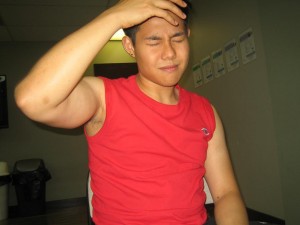
When children suffer from severe headaches, a migraine is the end result. It can take place momentarily or for longer time duration of up to 2 days. It’s best to understand that migraine in children is different than is the case when compared to adults. Statistics show that misdiagnosis is more likely to occur for children’s cases.
Migraine attacks least occurs in children under two years of age while risk is high in boys aged five years or older. The risk then reduces again as they enter adolescence. The material posted on this page on migraines in children is for learning purposes only. If you or your child has serious migraines consult a physician or see your doctor. To learn to recognize and manage injuries involving the head enrol in a first aid course today (click here to find a course).
[youtube url=”https://www.youtube.com/watch?v=QmSEFV279E4″ width=”200″ height=”200″]What Are the Symptoms of Migraine in Children?
The migraine mainly comes with an aura that follows with the symptoms. It may attack with the aura or it may not, but be on the lookout for the following:
- Blurred vision
- Speech loss
- Confusion
- Dizziness
- Loss of consciousness
- Difficulty describing aura
- Dramatic presentation
What Are the Syndromes?
There are many syndromes that may occur and may actually present a challenge in diagnosing. It’s vital to lookout for:
- Frequent Vomiting– This syndrome is exhibited more through girls than boys. There are several triggers that aggravate the situation, but it resolves by itself by teenage.
- Abdominal Migraine- These are characterized by pain in the abdominal area that may or may not cause vomiting. Plenty of rest and sleep is required to manage this type of migraine in children.
- Vertigo– This condition may exhibit itself alongside nausea in most cases. Some children may also lose consciousness or sense of hearing.
What Are the Ways for Managing A Migraine?
Same principles apply as to adults. The important things to remember include:
- Keep the child cool at all times. In the summer season, it tends to get hot and this is why parents need to keep their children equally hydrated.
- Parents ought to reassure their children. This will give them confidence in handling and overcoming episodes.
- Use painkillers as instructed by the doctor. Do not alter dosages as this will aggravate the situation.
- Managing migraine in children must be the responsibility of the entire families.
What Are the General Measures to be taken?
Seek medical attention to get a comprehensive explanation of the situation. It’s vital to know risk level so that fear, such as brain tumors, can be crossed off the list.
Avoid headache triggers. These mostly include stress, sleep or even missed meals. You’ll be able to reduce potential attacks by a huge percentage this way.
A behavioral strategy consisting of routines should be established. This will lay emphasis in distinguishing particular times such as meals, sleep and play.
Migraine in children can be effectively managed when the patient is placed in a dark, cool room. Shut off all surrounding noise from TVs and radios.
When seeking medical attention for recurrent episodes, be sure to remember previous medication.
All in all, seek immediate medical assistance for chronic cases. For acute cases, the condition is bound to resolve as the child enters into adulthood.